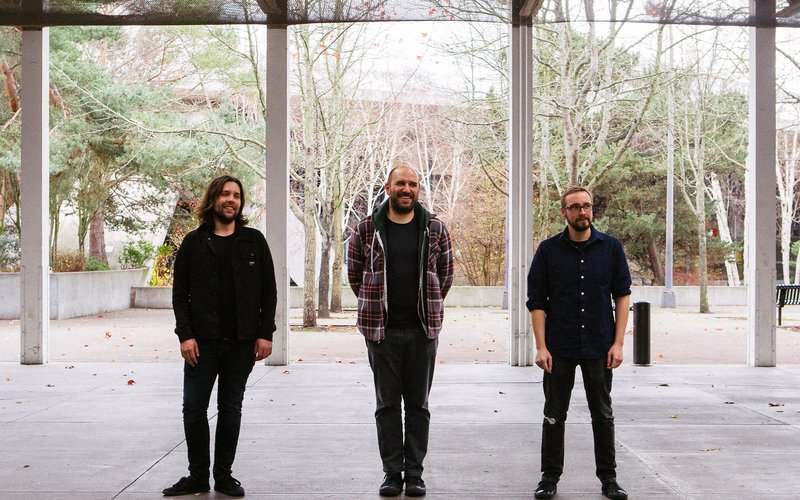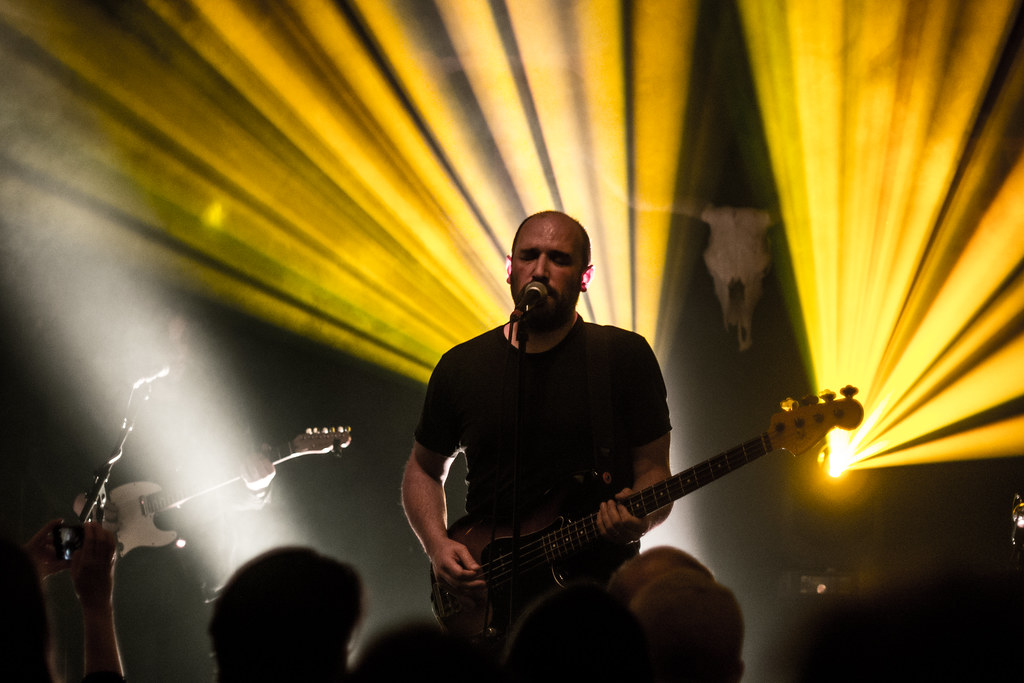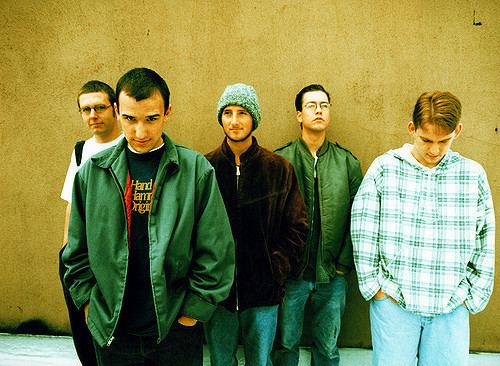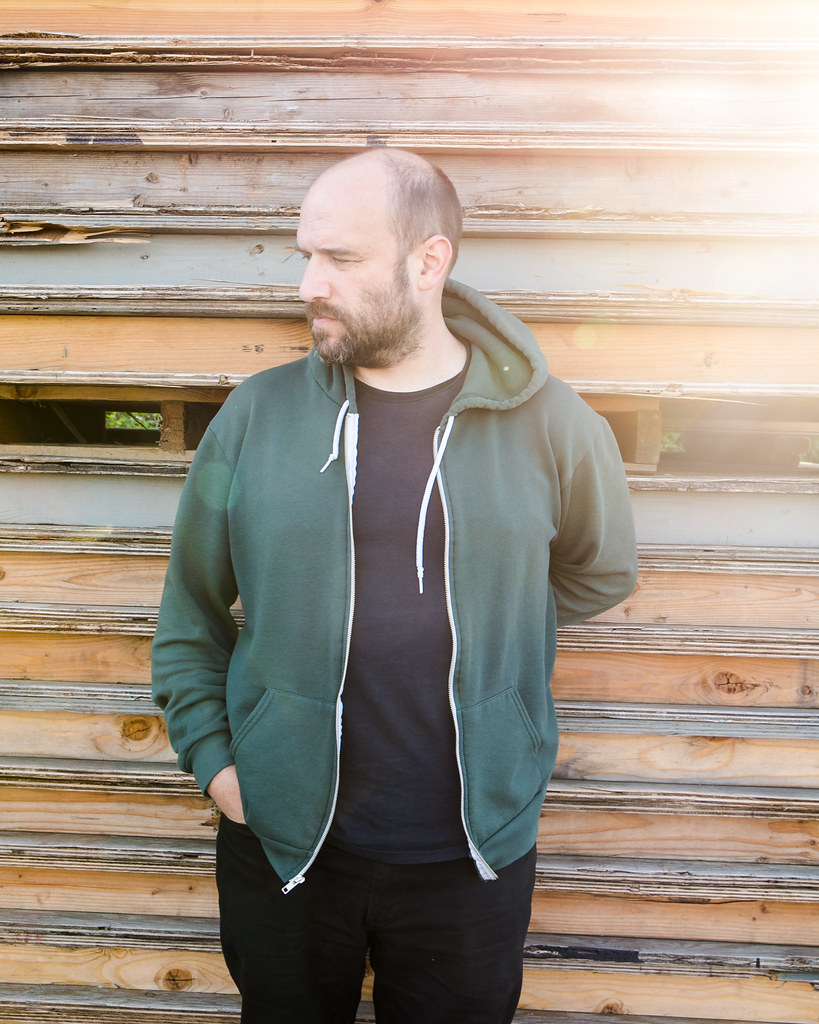
David Bazan was tired. On one of his frequent solo tours, driving a minivan alone across the country, he found himself in Phoenix, Ariz. and looking for a place to rest before he continued his endless sojourn. Bazan spent his adolescence in Phoenix and this wasn’t the first time he’d been back. Still, this time was different.
He took a day off from the road and decided to stay with his grandparents in town for the night. Being in Phoenix and riding by the house he grew up in got Bazan thinking. A flood of childhood memories came rushing back.
“I didn't ever think I would call any other place home for the first 12 years of my life,” he says. “And then to come back here repeatedly over the years and try to make peace with that without really facing all those feelings directly just created a lot of longing and a lot of ghostly feelings around the place.”
The epiphanies came a low point for Bazan, he says his drinking was becoming a problem. He says there was “a lot of the pain that I was kind of trying to quiet down with drinking so much it just kind of came back all the way.” Driving around town with these thoughts on his mind, realizing that it was finally time to deal with his problems. It was the start of a process that would become Pedro The Lion’s first album in 15 years, Phoenix, out Jan. 18 via Polyvinyl Records.
Bazan’s family moved around a lot as a kid, not getting closure on many periods of his life. He conceived the idea for the set of albums in a quick three-minute brainstorm in his car. Each record would set itself in a place he grew up and each would reflect both his personal experiences in these places and also invoke the feelings of each region. Naturally, it’d start with Phoenix.
But to really reckon with those feelings, Bazan would once again need to go back to the Valley of the Sun.

“It was just going through and being like, 'What am I? Where did I come from?' Where is this longing from? Where did I pick this loneliness up?’” Bazan says. “So, me going back through everything was the first bit, and in a way, it is my origin story – it's me tracing my way back, trying to find the trail of breadcrumbs back to where I can unpack and get out from under some of the longing and loneliness that seem to hit me when I come to these places that I used to live.”
Bazan opted to stay with his grandparents once again. Bazan’s four days in town would start at what he calls “magic hour,” sometimes referred to as “golden hour” – the time just before sunrise. He’d get up and leave his grandparents’ house at 5:30 a.m., get in the car, turn on some music, and start driving on the routes of his childhood.
The roads would take him to familiar haunts. Even just driving to a shopping center he hadn’t seen in 20 years unearthed a flood of memories. He’d carry around a voice recorder, narrating and singing into it when as he’d make his way across his hometown. At around 8 a.m., he’d come back to his grandparents’ home and workshop his ideas with a guitar in the back room until his grandparents woke up around 9 a.m. Then the three of them would go to breakfast, listening to music together in Bazan’s car.
He’d go out again alone in the evening, as the sun began to set and the shadows grew longer – another magic hour. He says sometimes he’d play more music in his car speakers, or just listen to the “sound of his own brain” processing his surroundings while he drove the same roads he once road on his yellow bike as a child.
Bazan didn’t try to impose anything on these morning and evening excursions. His only goal was to let himself feel and remember, knowing that the seeds would be planted for a record. He’d drive the same roads that he rode on his bike as a kid. But these magic hour drives weren’t just to get inspiration for a record – it was time for him to reflect and understand himself and where he’s from. Not everything was in service to writing an album.
“There was my process that was more in-depth and involved and went a lot more places than the record goes... making peace with certain aspects of this place,” Bazan says. “I didn't want to have to have the record do everything and represent everything, it needed to just be allowed to be a record.”
The metaphor wasn’t intentional. Returning to the old band name after 15 years and naming your first album after a mythical bird known for rebirth. And yet it writes itself so perfectly. It’s one of those things Pedro the Lion’s David Bazan says he only recognizes in hindsight. Over the phone, Bazan notes that the metaphor goes even further with the band’s previous record being called Achilles’ Heel, which he describes as a grandiose way of saying “peace out.” He calls it happenstance, or maybe it’s something his subconscious is doing that he’s unaware of.
Going back to Phoenix was only one part of Bazan’s reflective state of mind on this record. As he prepared for Pedro The Lion’s first album back, he also was looking at Pedro’s first album for guidance in approach.
“I realized that when I made It's Hard to Find a Friend, I did not know how to be self-conscious yet,” he says. “There is a way of being self-conscious that I could not have understood until I put my music out in the world and had a bunch of people write about it and pick it apart and judge it. And once that happened, a kind of self-consciousness crept in that I think I'd been fighting the whole time. Unwittingly losing the battle sometimes, to self-consciousness, and with Phoenix, I really wanted to just take a process and keep my head down and not think about how it was going to land.”

Even with this laissez-faire approach, intentionality has still been a hallmark of Bazan’s writing since the earliest days of Pedro The Lion, carrying through projects like Headphones and Lo Tom, as well as his solo career. In the Pedro catalog alone, he’d pen concept albums about corporate greed and extensive, thought-provoking ballads on the ups and downs of spirituality.
One thing all of his work has in common is that, while not always (but sometimes) without hope, it’s always going to be emotionally heavy. Whether it’s the mournful doubts of faith on “Secret of the Easy Yoke” or the crumbling of a marriage detailed on “Options,” Pedro The Lion songs historically aren’t light-hearted – but not without their cheeky moments.
Enter Phoenix, which opens with “Yellow Bike,” setting the scene of Christmas Day 1981 in Phoenix, Arizona. A young Bazan is thrilled at the sight of a bicycle under the tree. The driving drums and rolling bass mirror the percussive push and pull of pedaling down the sunkissed pavement. It’s the most upbeat and boisterous the band has ever been.
As the song goes on, Bazan reflects on his young self and the freedom he felt riding his bike down the road and the subsequent loneliness. “My kingdom for someone to ride with,” he sings.
“In a way, [Phoenix is] me explaining my origin story to myself first because I needed to do that,” Bazan says. As “Yellow Bike” already shows, we’re getting the origin story often in a literal sense. The album opens up dives into Bazan’s earliest years in a quest to understand himself and the way he is. The revelations he comes to on this new record also add a different color to the whole Pedro The Lion back catalog and the personal narratives he’s been weaving for decades.
Throughout the record, Bazan continually paints the image of the place he knew growing up. Wasting all his saved up allowance on candy and sugary soda on “Circle K,” the air-conditioned oases of “Model Homes,” and even naming off streets on closer “Leaving The Valley.” The record goes back and forth between life raised in a church-going, suburban family to interjections from the Bazan of today, traveling the country by minivan to play shows and support his family.
The empty backdrop of the desert is apt given the album’s prevailing themes of isolation. He compares the process of making the album to certain practices in therapy in which you connect with your younger self with a sense of understanding, offering comfort to your 10-year-old self and the stresses of the world. It’s a healing process.
“A big part of the record this is going back to that kid and giving that kid a way to think about those situations retroactively,” Bazan says. “And just tracing that loneliness that I still wrestle with and that I still don't totally have a handle on.”
The loneliness on “Yellow Bike” only grows as the record goes. It manifests itself in different ways. He calls it out in the daydreaming of “Model Homes,” walking through empty houses wishing he could start a family of his own to cure the aching feeling inside of him, at one point even belting, “I want to not be lonely.”
Things take a turn in “Quietest Friend,” in which he laments succumbing to peer pressure by mocking a shy peer who had opened himself up to Bazan. It’s one of those memories that haunt you – a moment where you hurt someone and never fixed it. On “Black Canyon” he details a gruesome scene of a man who walked in front of a truck, as witnessed by his paramedic uncle.
Religion looms over the record, as well. But it’s not the same fiery musing on the topic as we’ve seen with Bazan before.
The church is often mentioned as a background for the songs, like touring model homes after Sunday service, or it’s referred to obliquely like on the punchy “Clean Up” where he sings “I tried eternity and a couple of other drugs.” Yet there isn’t quite as much threat or conflict with faith on the record upfront.
“The trick with this record is [that] I wanted to represent the earnestness of my childhood space without suggesting that I still believe those things and without any kind of snark or wink,” he says. “I wanted to honor the beauty of the glimpses of my parents' face that I saw and their interactions surrounding it and I wanted to honor the beauty of my experience in a certain way. There were things about it that contributed to the difficulties in my life.”
This approach is seen clearest on the brief interlude “Piano Bench,” in which Bazan recalls sitting and staring at his parents playing music at Sunday service. He recalls the feelings of comfort he got as he watched his mom sing and his dad play side-by-side on the bench. As the album goes on, older Bazan’s perspective comes through as he reflects on the faith of his family in contrast to his wavering beliefs.
In the second verse of the raucous dirge of “My Phoenix,” he borrows and reframes lyrics from Randy Newman’s “God’s Song” and William Blake’s poem “The Everlasting Gospel.” He flips Blake’s line “The vision of Christ that thou dost see Is my vision’s greatest enemy” into “If the vision of the Christ my family sees is my blurry vision’s greatest enemy.” Likewise, with Newman’s song he rephrases “He chases round this desert ‘Cause he thinks that's where I'll be” to “You know I chase around this desert because I think that’s where you’ll be.” In both instances, which happen back-to-back on the song, Bazan says he’s using the words to “represent the loneliness of searching and putting myself in that position.”
“As a kid, God was an antidote to loneliness, to some degree, and working at cultivating that relationship was a slow burn antidote to loneliness,” he says. “But somehow or another I just was a really lonely kid, and then losing that connection later, or seeing it in a different light, that kind of caused it to not be as valid anymore.”
He continues, “That relationship that had cultivated with God or whatever that was or is, so in a sense going back there and realizing that, if you are chasing God around a desert and there's the possibility of finding that, then it's not as lonely of a place then when you are there and realize, ‘Oh, I've been looking forever and I think it's just the desert out here.’ And you can get used to that and there is a beauty in that, too. But the transition is quite lonely.”

As disparate as his experiences may seem on the record, they all confront the same longing that’s stayed with him his whole life. The gory details of “Black Canyon,” the innocence of “Circle K,” and the spiritual quandaries of “My Phoenix” are all a part of his story, and therefore inform who he has become. It’s also all the things he has to reckon with.
“Sitting and listening to stories about people walking in the front of semis to kill themselves alongside stories about you know Jesus crucified, they're not separate from each other they're all part of the same thing,” he says. “It's all of these customs and traditions and ways of thinking about the world that got handed down to me and there is no difference between them.”
The other factor here is the politics of the state and the politics that come with religion. Arizona has become the hotbed of political conflict in recent years, symbolizing national conversations in regards to border control and the criminal actions of Sherrif Joe Arpaio, whose racial profiling and abusive actions to immigrants in custody would earn him a conviction of contempt of court only to be pardoned by President Donald Trump.
Bazan’s politics couldn’t be more different, even brandishing “Abolish ICE” in his Twitter display name for months. When asked about how he reckons with the Phoenix of today with the Phoenix of his childhood, he said it was a realization that it’s always been this way. It also meant he had to deal with how, once again, the beliefs of family members differed from his own.
“All my values, I got [from] them – or I thought I did,” Bazan says. “And they are values that I still think are valid and I live by and have fueled my politics. And I thought I got those values from them.”
In his view, he sees Christianity to be under stress, showing its worst self as cultural shifts in the country cause political anxiety. Conservative politics and Christianity have somehow become intertwined in many areas, allowing themselves blind spots that give support to figures like Sheriff Arpaio.
For as pessimistic as his music may seem on the surface, there’s a linger of hope threaded in his back catalog and especially so on Phoenix. Bazan searches for his thoughts on this complicated topic on the phone, saying, “I still feel the disillusionment, and then just immediately after I think, 'But man, I still love it here, I still love these people and I still love, I still have hope that the empire can be brought down.'”
All of these ideas are hefty enough to warrant an album of their own, but also are topics many might not want to talk about. Bazan confesses some hesitation into what he mockingly refers to as an “audio memoir” and even questions “why does another white guy need to tell their story?” The questions are valid. But ultimately, what Phoenix offers is a moment of healing – for Bazan himself, but for others as well who might see themselves in Bazan’s experiences.
To understand yourself means to reckon with the past. It’s also about the value of your own story. That our memories and trials aren’t just in service to ourselves but maybe connect with a larger, more universal experience. The details can waver from person to person, but often we share many of the same traumas.
“[Phoenix] opens up a headspace to tell myself the story so that I can kind of understand that,” Bazan says. “I hope that raising my hand and asking the question in class, because it's five or six other people are having, that just can't verbalize it or won't or whatever, that there's some value there.”
David Bazan shares the first new music under his old moniker since 2004 Achilles’ Heel
David Bazan discusses taking up his old moniker once again, the next five Pedro albums, and utilizing his platform to bring attention to white male privilege and abuse against women.
The harsh cold air bites at my hands as I walk toward the Tractor Tavern to see Pedro The Lion play their first Seattle show in 11 years. The harshness of freezing breeze turns my thoughts to Pedro The Lion's "The Longest Winter." "In time memories fade, senses numb," the young David Bazan sings on…